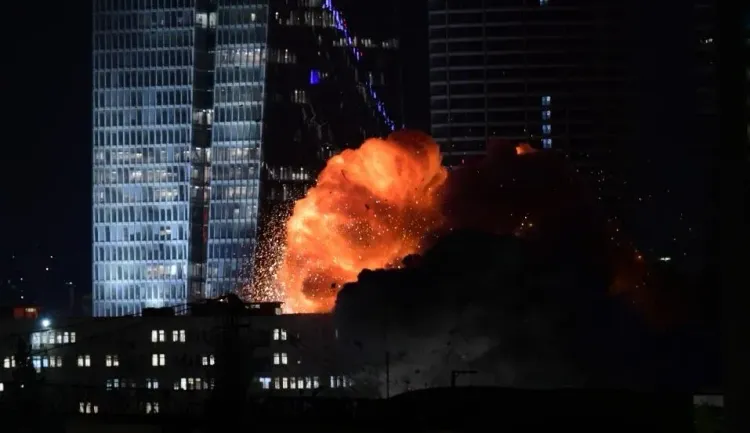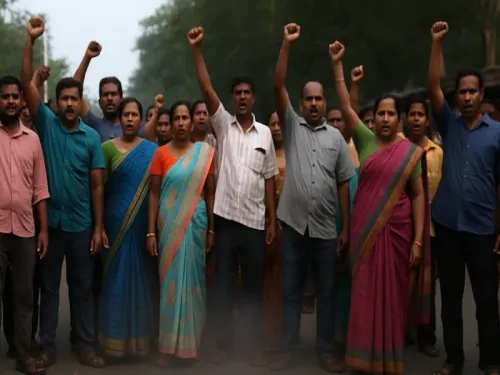FairPoint: Why Do Neighbours Always Seem So Terrible?

Synopsis
Key Takeaways
- Hostility among neighbouring nations is often fueled by historical grievances.
- Political ideologies and national identities play significant roles in shaping relationships.
- Pakistan's identity is largely defined by its opposition to India.
- Opportunities for peace are often hindered by military control and political narratives.
- The global landscape is increasingly polarized, complicating diplomatic relations.
New Delhi, June 15 (NationPress) A question that plagues not only individuals in regions plagued by conflict but also every socially aware global citizen is: Why do neighbours seem to be so hostile?
Globally, the dynamics between numerous bordering nations are characterized more by mistrust and animosity than by collaboration and harmony. From Russia's ongoing military engagement in Ukraine to the intricate and volatile Middle Eastern conflict involving Israel, Palestine, Iran, and Yemen, and back to the subcontinent, where India and Pakistan remain entangled in a fluctuating conflict -- tensions are perpetually high.
Why is it so challenging for countries to act as civilized neighbours?
The explanation is far from straightforward. Global diplomacy is multifaceted and often politically charged. Historical grievances, national identities, hastily drawn borders, and the remnants of colonialism have left profound scars. The influence of religion and ideology frequently exacerbates these divides. Yet, amidst this complexity lies an unsettling reality: certain nations embrace confrontation not merely as a reaction but as an integral aspect of their identity.
Consider Pakistan, for example. Since its formation on August 14, 1947, it has constructed its national identity in opposition to India. Right from its birth as a distinct nation—emerging from the violent partition of the subcontinent—it has behaved not as a neighbour aspiring for peaceful coexistence, but rather as a rival consumed by resentment. Its fixation on the two-nation theory and religious identity has propelled its political landscape into a state of relentless hostility.
The trend of aggression was established early on. From sending tribal raiders to annex Kashmir shortly after Independence to instigating multiple wars in 1947, 1965, 1971, and 1999, and ultimately engaging in cross-border terrorism throughout the 1990s—Pakistan has checked every box on the "how to be a bad neighbour" list. While its political leaders often utter the rhetoric of peace, the military establishment firmly maintains control, convinced that hostility with India is essential for their grip on power.
When the Chief of the Pakistani Army made a divisive statement targeting Hindus and Muslims, followed swiftly by the April 22 Pahalgam terror attack, it became apparent how deep this rot runs. The attack was not merely another instance of terrorism; it was a stark signal that the pretense of denial was being discarded. Pakistan, which had long claimed not to harbor terrorist elements, is now openly acknowledging them.
Images and videos of high-ranking military officials attending the funerals of terrorists killed in Operation Sindoor and being awarded state honors revealed Pakistan's duality. It has made it clear to the world that terrorists are considered part of its arsenal. The political class and military-led establishment prioritize nurturing terrorist groups over addressing poverty.
According to World Bank statistics, nearly 45 percent of Pakistan's population lives in poverty, with 16.5 percent classified as living in extreme poverty.
The economy is barely surviving, relying on bailouts from the IMF every few years. Yet, despite these challenges, the country continues to channel resources into terrorism instead of education and healthcare.
For over thirty years, Pakistan has developed a covert war strategy against India—equipping, financing, and sheltering terrorist networks while maintaining plausible deniability on international stages.
The 26/11 Mumbai attacks, perhaps the most tragic episode in contemporary Indian history, have yet to result in justice due to Pakistan's ongoing obfuscation and deceit.
However, the landscape is shifting. The April 22 attack in Pahalgam appears to have crossed a critical threshold. India has made it abundantly clear that such actions will no longer be tolerated. Operation Sindoor, the military and strategic counteraction to this latest provocation, marks a pivotal moment. India will no longer let proxy warfare go unanswered. The gloves are off.
In a broader context, this situation transcends the India-Pakistan dynamic. It speaks to how nations interpret power, identity, and survival in a polarized global landscape.
Russia perceives Ukraine's alignment with the West as a threat; Israel, engaged in an existential battle, responds with overwhelming force while its adversaries delve deeper into extremism.
In each of these relationships, grievances and retaliatory actions perpetuate a cycle that leaves little room for dialogue.
For Pakistan, opportunities to reset relations with India have arisen and faded multiple times. But as long as its military dictates its foreign policy and its political narrative remains entrenched in identity conflicts, change seems unlikely.
Currently, the future of Ukraine-Russia, Israel-Hamas, and possibly the Israel-Iran situation remains uncertain, with the potential for new hotspots to emerge at any moment.
India has wisely paused its Operation Sindoor, keeping Pakistan in a constant state of apprehension. The neighbour may be quiet for now, but its covert attempts to incite unrest in Jammu and Kashmir persist. The military has been effective in thwarting infiltration efforts along the Line of Control in the region.
Despite being under scrutiny, the unfortunate reality remains: some neighbours appear stubbornly committed to remaining terrible.
(Deepika Bhan can be contacted at deepika.b@ians.in)









